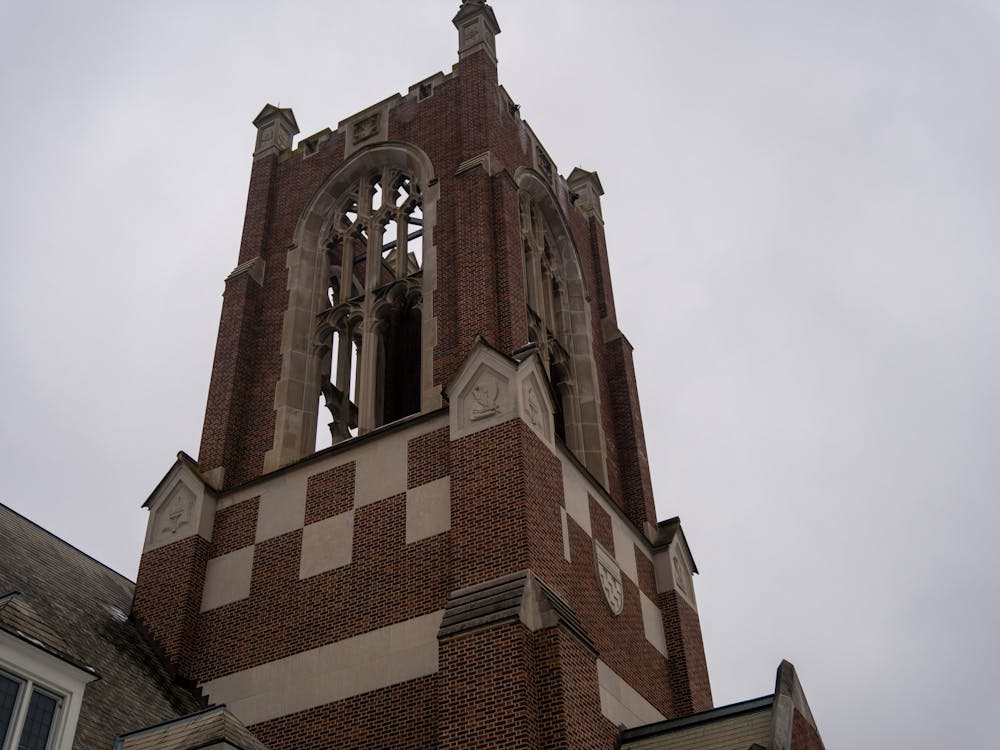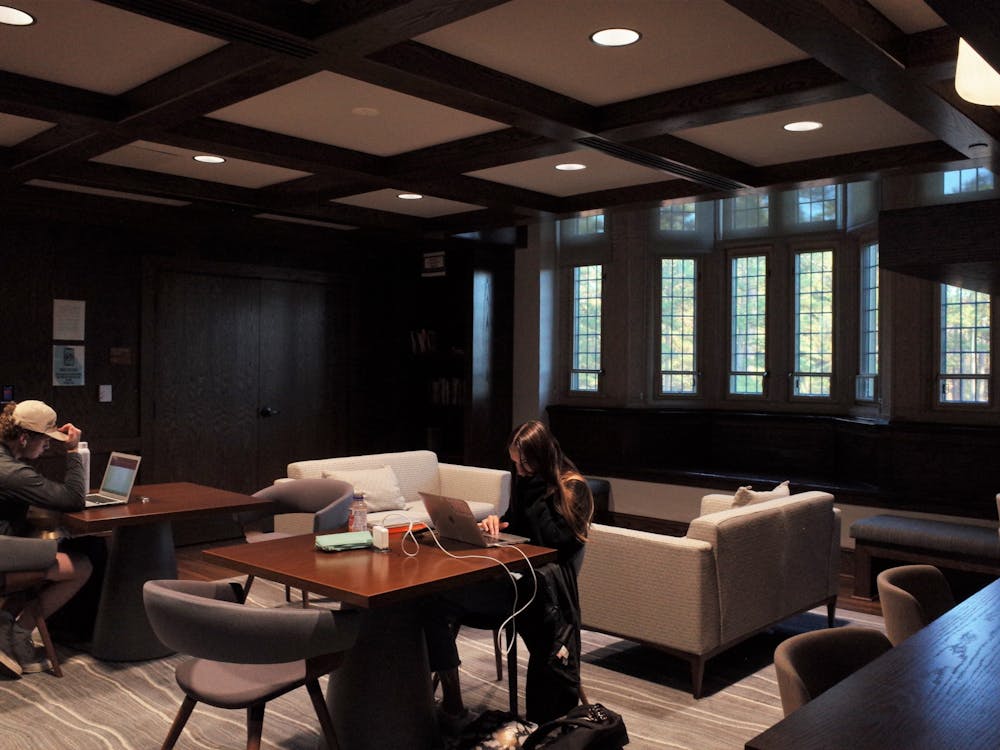A black-faced doll with black curly hair hanging from a noose in the Cousins Studio Theater was found with a note that read, "ART IS DEAD. Long LIVE art."
The note, written in cutout notebook paper letters, was found the Thursday morning before spring break by David Howson, associate director of the Modlin Center for the Arts. Howson had locked the door at 9 p.m. the previous night, said Walter Schoen, chairman of the theater and dance department.
The doll and noose were immediately removed Thursday morning, Schoen said, but police were not notified.
Howson said when he first saw the doll, he thought it might have been part of a student or coming production.
"It's not that unusual to see something provoking in the theater," Howson said. "You see that all the time. So that was our first order of business."
The doll measured 18 to 22 inches long and hung about four feet above the floor facing the back of the stage. The way the doll was hanging, he said, it looked like it could have been a leprechaun because of the green outfit and hat and black shoes, when standing at the door to the theatre.
"When I actually walked upstage and saw this from the front, I was ... I was angry. I was mad. I was hurt," Schoen said. "If you take the letters seriously, you could ask yourself, 'Were they trying to make a statement about art?'
"On the other hand, it's really impossible to look at that image, particularly if you're looking at the image from the direction that you see the face. Once you see that image \0xAD hanging \0xAD you're not paying any attention to the letters on the floor. I don't think you can look at that image and not take away hatred and prejudice."
Schoen said students' theater training talked a lot about how everything in theater has meaning, even the smallest details, including the doll's skin color. Because of this, the doll's dark skin color cannot be ignored as incidental, he said.
The theater requires either a key or door lock code to open the doors, but all theater students know the lock's code to allow them 24-hour access, said senior theater major Claire Natkin. Once in the theater, a person has access to the props inside. The doll and rope had both been props in previous plays.
Schoen said he had talked and met with faculty and staff members of the theater department and the Modlin Center, along with the deans, among others, during break to discuss the incident. On March 18, the theater department invited theater students to a meeting in Cousins to discuss the incident, and Howson put the doll back up as it was when he found it for attendees to see when they came in, Schoen said.
"A number of us heard about what happened beforehand, but there is really nothing that could've prepared anyone, I don't think, for walking in and actually seeing it," said senior theater major Tori Foster, who attended the meeting. "It just felt like a complete violation when we walked in, because the space is usually really welcoming and almost like our home. It was really heartbreaking to walk into that space that's usually so positive and to see something that's completely opposite to everything that we usually do in that space and that we stand for."
Enjoy what you're reading?
Signup for our newsletter
Foster said she felt disgusted rather than comfortable while in the room. During the meeting, attendees not only discussed how upset they were, but also what they could constructively do about the situation, she said.
Natkin said: "After the meeting, I've never been as proud to be a theater major at the University of Richmond. We see this act of hatred as something that we can address with our art and our expression.
"Obviously, if you're going to write a note like that, it seems like it was pre-planned. But for me, it seems like nothing but pointless agitation, just upsetting people. I can't see that it had any sort of productive cause to it."
Kathy Panoff, executive director of the Modlin Center, said the incident was clearly hate speech, but it was also an opportunity for the department to look at issues of inclusion on a day-to-day basis. Since the incident occurred after the university president's office sent out notes regarding previous incidents, those involved in the discussions decided that it would be better to approach it differently and instead really make the students influential in the outcome, she said.
Two decisions came out of the meeting. The students collectively dismantled the hanging elf because they did not want it in their space and decided to make a statement, Panoff said.
"They took it as an opportunity to lead the campus in understanding that diversity and inclusion happens each and every day in the little things that people do," she said. "I also now have come to understand that this whole incident is a gift for the campus. It's a time to pause, make amends and begin to change our behaviors each and every day."
Foster said that the coming play "The Meeting," which is about an imaginary meeting between Martin Luther King Jr. and Malcolm X, has caused some controversy. There are only two characters, both who are black and were professionally cast, causing students to wonder what their roles in the play would be, and why the play was relevant, she said. These events have shown students the meaning and relevance of the play, she said, and made them value the show more. Panoff said that there was speculation that this could have been a statement about "The Meeting."
Associate theater professor Chuck Mike is one of three African-Americans in the theater department. Mike is the director of "The Meeting" and said it was ironic that this had happened at a time when the department was getting ready for a play, which deals directly with these incidents.
This type of incident is clear evidence of success, he said. Because the university is becoming an increasingly diverse community, there will be more such incidents occurring, he said, because Richmond has historically been an all-white institution, Mike said. The fact that this incident occurred within the theater department was irrelevant, but was significant of the wider university. On one hand, he said, the act was cowardly and insidious, but on the other hand was clearly an act of ignorance.
When law enforcement is not called in to deal with a crime, he said, it sends out the wrong signals.
"I'm only disturbed when there is silence," Mike said. "Racism is a major issue in America right now. And it's a nasty little devil that if we allow it to weave its way into our hearts here, it could destroy us. We have to be very vigilant and cautious, and above all, blatantly open with discussions on race despite the discomfort that it breeds, because without that, we won't see much of a change."
The department has not yet decided on a specific course of action, Schoen said.
Support independent student media
You can make a tax-deductible donation by clicking the button below, which takes you to our secure PayPal account. The page is set up to receive contributions in whatever amount you designate. We look forward to using the money we raise to further our mission of providing honest and accurate information to students, faculty, staff, alumni and others in the general public.
Donate Now


